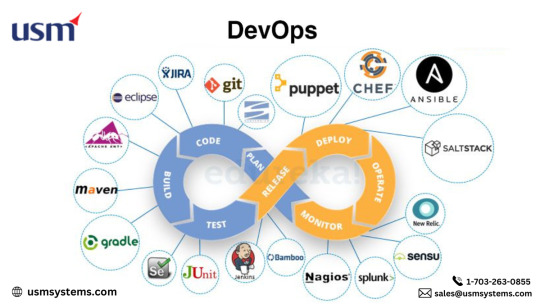#DevOpsForBusiness
Explore tagged Tumblr posts
Text

How to Maximize Business Productivity with Top DevOps Automation Tools?
Maximizing business productivity with top DevOps automation tools involves streamlining development, deployment, and monitoring processes. Tools like Jenkins, Docker, Kubernetes, and Ansible help automate workflows, enhance collaboration, and improve system reliability. Implementing CI/CD pipelines, infrastructure as code (IaC), and automated testing ensures faster software delivery with minimal errors. Integrating AI-driven analytics further optimizes performance and resource utilization.
USM Business Systems
Services:
Mobile app development
Artificial Intelligence
Machine Learning
Android app development
RPA
Big data
HR Management
Workforce Management
IoT
IOS App Development
Cloud Migration
#DevOpsAutomation#BoostProductivity#BusinessAutomation#TopDevOpsTools#MaximizeEfficiency#DevOpsForBusiness#SmartAutomation#WorkplaceProductivity#AIinDevOps#OptimizeWorkflow
0 notes
Text
What is the Difference Between DevOps and DevSecOps?

Introduction
Are you confused about the difference between DevOps and DevSecOps? We assure you that you’ll gain clarity after reading this blog. Let’s start!
In today’s fast-changing tech world, DevOps and DevSecOps are critical yet distinct. DevOps emphasizes collaboration between development and operations teams, leveraging automation to streamline processes. DevSecOps, a natural evolution of DevOps, integrates security practices throughout the software development lifecycle, ensuring secure, high-quality software delivery.
What is the Difference Between DevOps and DevSecOps?
DevOps:
DevOps is a cultural and technical approach that bridges the gap between development and operations teams to accelerate software delivery. It uses automation, collaboration, and continuous feedback to enhance productivity and ensure efficient, reliable software releases.
Key Features of DevOps:
Collaboration: Developers and operations teams unite to break down silos, fostering better communication and shared goals for smoother workflows.
Automation: By automating routine tasks such as testing, deployment, and infrastructure setup, teams can focus on innovation and productivity.
Continuous Integration and Deployment (CI/CD): Streamlines the process of merging code, testing it automatically, and deploying it seamlessly to production environments.
DevSecOps:
DevSecOps integrates security into every stage of the development pipeline, emphasizing proactive identification and resolution of vulnerabilities. It ensures that security is a shared responsibility among development, operations, and security teams.
Key Features of DevSecOps:
Shift-Left Security: Embeds security considerations from the earliest stages of development, reducing risks and costs.
Automation in Security: Utilizes tools to automate vulnerability scans, compliance checks, and security testing, accelerating secure deployments.
Continuous Security Monitoring: Leverages monitoring solutions to identify and mitigate security risks in real-time.
Tools Used in DevOps and DevSecOps
DevOps Tools:
Continuous Integration and Deployment: Jenkins: Automates the process of building, testing, and deploying software. GitLab CI/CD: Offers integrated pipelines for efficient code versioning and deployment.
Containerization: Docker: Provides lightweight containers to ensure consistency across environments. Kubernetes: Orchestrates containerized applications, managing scaling, deployment, and availability.
Version Control: Git: Tracks code changes and enables seamless collaboration among developers. GitHub: A platform for managing Git repositories and enabling open-source contributions.
Collaboration and Communication: Slack: Facilitates instant communication and file sharing among team members. Microsoft Teams: Supports collaboration through chat, video calls, and integrations with other tools.
DevSecOps Tools:
Security Automation: SonarQube: Performs static code analysis to detect bugs and security issues.
Vulnerability Scanning: OWASP Dependency-Check: Focuses on detecting known vulnerabilities in project dependencies. Nessus: Offers comprehensive vulnerability assessment for applications and networks.
Infrastructure as Code (IaC) Security: HashiCorp Terraform: Automates infrastructure provisioning while ensuring security best practices. Checkov: Validates IaC configurations to ensure compliance with security policies.
Objectives and Scope of DevOps and DevSecOps
Objectives of DevOps:
Accelerate Software Delivery: Reduce time-to-market by streamlining development, testing, and deployment processes.
Improve Quality: Achieve higher-quality software with automated testing and continuous monitoring.
Enhance Efficiency: Optimize workflows by eliminating manual tasks through automation.
Scope of DevOps:
Automation: Automate repetitive tasks to free up resources for innovation and problem-solving.
CI/CD Pipelines: Establish robust pipelines for continuous integration, testing, and deployment.
Cross-Functional Collaboration: Strengthen teamwork across development, testing, and operations functions.
Objectives of DevSecOps:
Integrate Security Proactively: Address security concerns early and throughout the development lifecycle.
Minimize Vulnerabilities: Employ advanced tools and practices to reduce risks in applications and infrastructure.
Promote Shared Security Ownership: Cultivate a security-first mindset across all teams involved in the development process.
Scope of DevSecOps:
Secure CI/CD Pipelines: Incorporate security checks into CI/CD pipelines to prevent vulnerabilities from reaching production.
Threat Detection and Mitigation: Employ tools to identify and neutralize threats in real-time.
Policy Compliance: Validate configurations and deployments against security standards.
Continuous Improvement: Use feedback loops and monitoring to strengthen security practices consistently.
How DevOps and DevSecOps are Related
DevOps as the Foundation: DevOps establishes a culture of automation and collaboration, which DevSecOps builds upon by adding a security focus.
Shared Tools and Practices: Many DevOps tools are extended with security features to align with DevSecOps goals.
Common Objectives: Both aim to deliver reliable, high-quality software efficiently while addressing key concerns such as performance (DevOps) and security (DevSecOps).
Benefits of Adopting DevOps and DevSecOps
Benefits of DevOps:
Faster Delivery: Achieve rapid deployment cycles without compromising quality.
Enhanced Collaboration: Improve team cohesion and shared understanding.
Operational Efficiency: Streamline processes to save time and resources.
Benefits of DevSecOps:
Stronger Security: Integrate robust security measures into development workflows.
Reduced Vulnerabilities: Address security gaps proactively.
Compliance Assurance: Simplify adherence to regulations and standards.
Future Trends in DevOps and DevSecOps
DevOps:
· AI and ML Integration
· Infrastructure as Code (IaC)
· Enhanced Observability
DevSecOps:
· Zero-Trust Security Models
· Continuous Everything (CX)
· Regulatory Compliance
Conclusion
In conclusion, DevOps and DevSecOps are integral to modern IT practices. DevOps accelerates delivery and fosters collaboration, while DevSecOps integrates security to ensure resilient, high-quality applications. Together, they empower organizations to innovate efficiently and securely, preparing for a future driven by automation, AI, and robust security measures. Organizations can benefit greatly from DevOps consulting services in Chennai to enhance their implementation strategies and achieve these goals effectively.
#DevOps#DevSecOps#TechInnovation#ContinuousIntegration#CyberSecurity#kryonknowledgeworks#technology#DevOpsServices#DevOpsConsulting#DevOpsSolutions#ManagedDevOps#DevOpsSupport#DevOpsForBusiness#CloudTransformation#ITOptimization#ScalableIT#AutomationSolutions#DigitalTransformation#BusinessInnovation#TechForBusiness#ITInfrastructure#CloudServices#EnterpriseSolutions#TechConsulting#ITStrategy#ITServices
0 notes
Text

How DevOps Engineering Benefits Your Business Implementing DevOps can drastically improve your time to market, increase collaboration, and boost overall productivity. By streamlining processes, automating workflows, and fostering continuous integration, DevOps is the future of efficient software delivery. Is your business ready to adopt DevOps? Visit: https://www.synclovis.com/services/devops-consulting-services/
#BusinessGrowth#DevOpsForBusiness#TechEfficiency#AutomationSuccess#DevOpsTransformation#business#technology#ecommerce#accounting#commercial#economy#finance#entrepreneur#founder#branding
0 notes